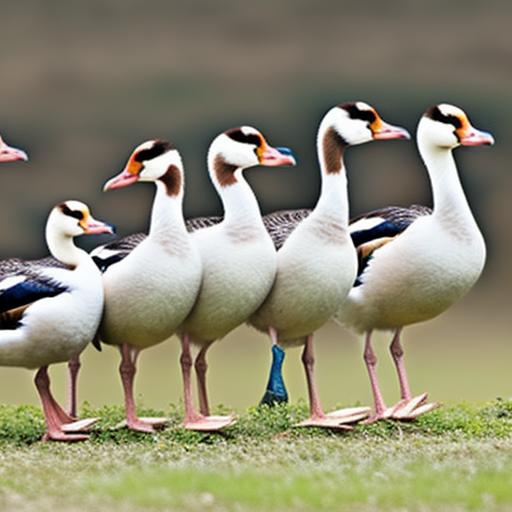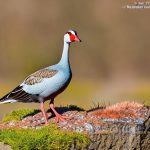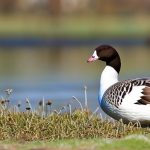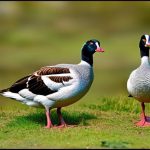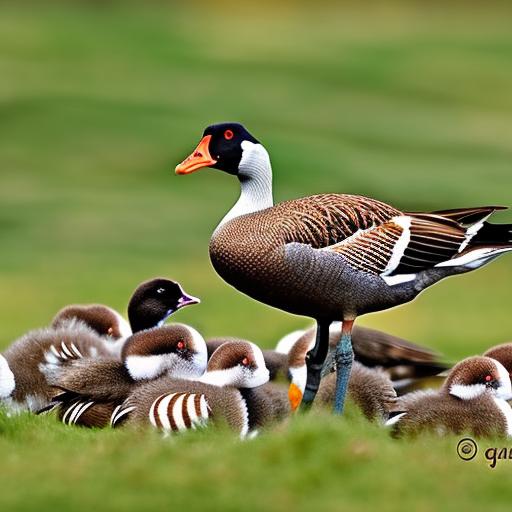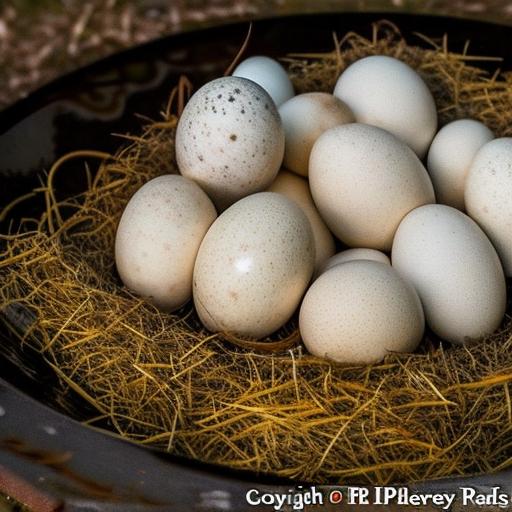Chinese Geese, also known as Swan Geese, are a domesticated breed of geese that originated in China. They are known for their elegant appearance, with a long neck and graceful posture. Chinese Geese have a unique color pattern, with a white body and black feathers on their wings and tail. They are medium-sized geese, weighing between 10-12 pounds on average.
Chinese Geese have been bred for centuries for their meat, eggs, and feathers. They are also popular as ornamental birds due to their striking appearance. These geese are known for their calm and gentle temperament, making them suitable for both backyard and commercial breeding.
Key Takeaways
- Chinese geese are a popular breed of domesticated geese known for their distinctive appearance and friendly temperament.
- Factors affecting breeding age in Chinese geese include genetics, nutrition, and environmental conditions.
- The ideal breeding age for Chinese geese is between 2 and 3 years old, when they have reached sexual maturity and are physically mature enough to handle the demands of breeding.
- Signs of maturity in Chinese geese include physical changes such as the development of secondary sexual characteristics and behavioral changes such as increased aggression and territoriality.
- Health considerations for breeding Chinese geese include regular veterinary check-ups, proper nutrition, and disease prevention measures such as vaccination and quarantine.
Factors Affecting Breeding Age
Several factors can affect the breeding age of Chinese Geese. These factors include genetics and breed, nutrition and diet, and environmental factors.
Genetics and breed play a significant role in determining the breeding age of Chinese Geese. Different breeds may have different maturity rates, with some reaching sexual maturity earlier than others. It is essential to choose geese from reputable breeders who prioritize breeding for health and early maturity.
Nutrition and diet also play a crucial role in the breeding age of Chinese Geese. A well-balanced diet that includes high-quality feed and access to fresh water is essential for proper growth and development. Nutritional deficiencies can delay sexual maturity in geese, so it is important to provide them with the necessary nutrients they need.
Environmental factors such as temperature, lighting, and space can also affect the breeding age of Chinese Geese. Geese require a comfortable environment to thrive and reach sexual maturity. Extreme temperatures or overcrowding can delay their development and breeding age.
Ideal Breeding Age for Chinese Geese
The ideal breeding age for Chinese Geese varies between males and females. Male geese typically reach sexual maturity between 2-3 years of age, while females reach maturity slightly earlier, at around 1-2 years of age.
Breeding geese at the ideal age has several benefits. Younger geese are generally more fertile and have a higher success rate in breeding. They are also more likely to produce healthy offspring. Breeding geese at the ideal age allows for optimal reproductive performance and ensures a successful breeding season.
Signs of Maturity in Chinese Geese
There are several physical and behavioral signs that indicate maturity in Chinese Geese. Physical signs include the development of secondary sexual characteristics such as larger size, longer necks, and more prominent knobs on the males’ heads. Female geese may also develop a brood patch, which is a bare area on their abdomen used for incubating eggs.
Behavioral signs of maturity include increased vocalization, territorial behavior, and courtship displays. Male geese may become more aggressive towards other males during the breeding season, while females may exhibit nesting behavior and become more protective of their nesting area.
To determine if a goose is ready for breeding, it is important to observe these signs of maturity and ensure that they are within the recommended breeding age range.
Health Considerations for Breeding Chinese Geese
Breeding Chinese Geese requires careful attention to their health and well-being. There are several common health issues that can affect breeding geese, including respiratory infections, parasites, and egg-related problems.
Respiratory infections can be caused by poor ventilation or exposure to cold drafts. It is important to provide a clean and well-ventilated environment for breeding geese to prevent respiratory issues. Regular veterinary check-ups and vaccinations can also help prevent respiratory infections.
Parasites such as worms can affect the overall health and reproductive performance of geese. Regular deworming and proper sanitation practices can help control parasite infestations.
Egg-related problems such as egg binding or egg peritonitis can occur in breeding geese. These conditions can be life-threatening and require immediate veterinary attention. Providing a proper nesting area with clean bedding and monitoring egg production can help prevent these issues.
Breeding Season for Chinese Geese

The breeding season for Chinese Geese typically occurs in the spring, from March to May. During this time, geese become more active and exhibit mating behaviors. It is important to provide a suitable environment for breeding during this season, including access to water for mating rituals and nesting areas for egg-laying.
Factors such as temperature and daylight hours can affect the breeding season of Chinese Geese. Geese require a certain amount of daylight to trigger their reproductive hormones. As the days get longer in the spring, geese naturally enter their breeding season.
Reproductive Behavior of Chinese Geese
Chinese Geese have unique mating habits and rituals. Male geese perform elaborate courtship displays to attract females. These displays include head bobbing, wing flapping, and honking. The male will also chase the female and make low-pitched calls to signal his interest.
Once a pair has formed, they will engage in mating behavior. Mating typically occurs in or near water, with the male mounting the female from behind. After mating, the female will lay eggs in a nest she has built or chosen.
Breeding Management Practices for Chinese Geese
Proper breeding management practices are essential for successful breeding of Chinese Geese. Housing and nesting requirements should be provided to ensure a comfortable environment for breeding geese.
Geese require a spacious area with access to water for mating rituals and bathing. A secure and predator-proof enclosure is necessary to protect the geese during the breeding season.
Nesting areas should be provided for female geese to lay their eggs. This can be a simple nest box or a designated area with clean bedding material. It is important to regularly check and clean the nesting area to prevent the spread of diseases.
Breeding Age Guidelines for Male and Female Chinese Geese
The recommended breeding age range for male Chinese Geese is between 2-3 years, while females can start breeding as early as 1 year of age. Breeding geese at these ages ensures optimal reproductive performance and healthy offspring.
Breeding geese too early or too late can have negative consequences. Breeding geese too early may result in smaller clutch sizes and lower fertility rates. On the other hand, breeding geese too late may result in reduced fertility and reproductive performance.
It is important to consider the individual health and maturity of each goose when determining the ideal breeding age. Consulting with a veterinarian or experienced breeder can provide valuable guidance in determining the best breeding age for your geese.
Importance of Proper Nutrition for Breeding Chinese Geese
Proper nutrition is crucial for breeding Chinese Geese. During the breeding season, geese have increased nutritional requirements to support egg production and reproductive performance.
A well-balanced diet that includes high-quality feed is essential for breeding geese. The feed should contain adequate levels of protein, vitamins, and minerals to support optimal reproductive health. It is also important to provide access to fresh water at all times.
Feeding strategies such as free-choice feeding or controlled feeding can be implemented depending on the specific needs of the geese. Monitoring their body condition and adjusting their diet accordingly can help ensure optimal breeding success.
In conclusion, breeding Chinese Geese can be a rewarding experience with proper management and care. By understanding the factors affecting breeding age, signs of maturity, health considerations, and breeding management practices, you can ensure a successful breeding season and healthy offspring. Remember to prioritize proper nutrition and consult with a veterinarian for any health concerns.
If you’re interested in learning more about the breeding age of Chinese geese, you may also find this article on duck mating season informative. Understanding the timing and behavior of duck mating can provide valuable insights into the breeding patterns of other waterfowl species, including geese. To read more about this topic, click here. Additionally, if you’re looking for tips on building a chicken coop in Muskegon or Grand Island, Nebraska, these articles on chicken coop construction in Muskegon (link) and Grand Island (link) might be of interest to you.
FAQs
What is the breeding age of Chinese geese?
Chinese geese reach sexual maturity at around 7-8 months of age.
How many eggs do Chinese geese lay per year?
Chinese geese can lay up to 50-60 eggs per year.
What is the incubation period for Chinese goose eggs?
The incubation period for Chinese goose eggs is around 28-30 days.
What is the ideal temperature for incubating Chinese goose eggs?
The ideal temperature for incubating Chinese goose eggs is between 99-100 degrees Fahrenheit.
How long do Chinese geese live?
Chinese geese can live up to 10-15 years.
What is the average weight of a Chinese goose?
The average weight of a Chinese goose is around 10-12 pounds.
What is the average height of a Chinese goose?
The average height of a Chinese goose is around 20-26 inches.
What is the average lifespan of a Chinese goose?
The average lifespan of a Chinese goose is around 10-15 years.
Meet Walter, the feathered-friend fanatic of Florida! Nestled in the sunshine state, Walter struts through life with his feathered companions, clucking his way to happiness. With a coop that’s fancier than a five-star hotel, he’s the Don Juan of the chicken world. When he’s not teaching his hens to do the cha-cha, you’ll find him in a heated debate with his prized rooster, Sir Clucks-a-Lot. Walter’s poultry passion is no yolk; he’s the sunny-side-up guy you never knew you needed in your flock of friends!

